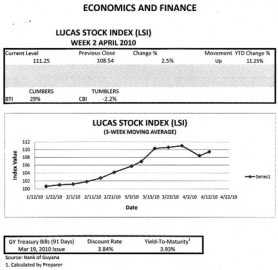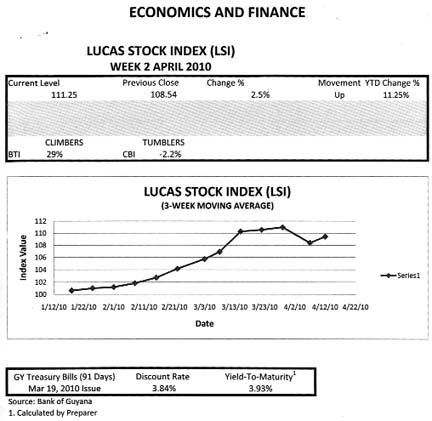Companies in Index
The LSI measures the combined performance of nine of the 14 companies registered with the Guyana Stock Exchange. The nine companies and their symbols are Banks DIH (DIH), Caribbean Container Incorporated (CCI), Citizen’s Bank (CBI), Demerara Bank Limited (DBL), Demerara Distillers Limited (DDL), Demerara Tobacco Company (DTC), Guyana Bank for Trade and Industry (BTI), Republic Bank Limited and Sterling Products Limited (SPL). The five companies that were excluded from the index are Globe Trust Investment Limited (GTI), JP Santos (JPS), Property Holdings Incorporated (PHI), Guyana Stockfeeds Incorporated (GSI) and Trinidad Cement Limited (TCL). Globe Trust was excluded because it was not considered a going concern while the other four companies were left out for lack of sufficient information. However, the nine entities represent 70 percent of the going-concern companies listed on the Guyana Stock Exchange.
 With these nine, the LSI accounts for 88 percent of the issued capital among the 13 viable private businesses that make up the population of the Guyana Stock Exchange. The equity among these nine companies, as valued by the market, also represents more than one quarter, 28 percent, of the Guyana economy. It should be pointed out too that by virtue of its makeup, the index covers primarily the manufacturing and financial sectors of the Guyana economy. The index does not take account of entities that operate directly in the construction, communication, transportation, mining and agricultural sectors simply because companies that perform in these sectors are not members of the Guyana Stock Exchange.
With these nine, the LSI accounts for 88 percent of the issued capital among the 13 viable private businesses that make up the population of the Guyana Stock Exchange. The equity among these nine companies, as valued by the market, also represents more than one quarter, 28 percent, of the Guyana economy. It should be pointed out too that by virtue of its makeup, the index covers primarily the manufacturing and financial sectors of the Guyana economy. The index does not take account of entities that operate directly in the construction, communication, transportation, mining and agricultural sectors simply because companies that perform in these sectors are not members of the Guyana Stock Exchange.
Components of Index
The LSI is a capitalization-weighted measure that was developed using the Laspeyres formula for weighted averages. With this formula, the index utilizes the last trade price of each stock as shown in the GASCI Journal at the end of the week and the total number of shares outstanding to report movement in market value. Information on outstanding shares is taken from the published annual reports of companies and from published articles. The index does not make any adjustments for restricted shares. However, the index does take account of changes in stock prices and these changes are weighted relative to the total value of all outstanding shares in an effort to increase the usefulness of the measure. In constructing the index, it was decided to look to the future and not backwards. Consequently, the base period of the index is January 4, 2010, which corresponds to the start of the trading season for 2010. The base of the index therefore is the market capitalization of the included stocks at that point in time, and the long-term trends of the market will be measured from that point of origin.
However, the index will report changes in value from week to week.
Notwithstanding its forward-looking emphasis, the behaviour of the stock market during prior periods can be determined with the use of this tool.
Utility of Index
The LSI is not intended as a substitute to any national accounting measure used by private and public officials to forecast economic outcomes. Instead, the LSI is intended as an independent measure of performance, and represents one more tool with which Guyanese can assess the management of the economy.
However, the continuous availability of the index removes the need to depend exclusively on the periodic reports of the Statistical Bureau or the Bank of Guyana, which are often published with a delay, for evidence of national trends. At the same time, stocks are not heavily traded on the Guyana Stock Exchange. Yet, the price of individual stocks periodically exhibit dramatic movement. Hopefully, the index will provide Guyanese with a clearer recognition of the inchoate behaviour of individual stocks.
Even though stocks are not heavily traded on this Exchange, the index will still serve the purpose of providing Guyanese with a clearer picture of the performance of the equity portfolio and the general trend of the stock market.
Also, the LSI will make comparing returns of various investment instruments easier. For example, it would be easier to see how the interest being earned on a Certificate of Deposit (CD) stacks up against the returns from owning shares in the private companies on the stock market. No attempt will be made to publish these rates since they vary among banks. Given the companies that make up the index, the results would be most relevant to stocks in the manufacturing and financial services sectors. However, the discount rate and the associated yield will be published for the 91-day Treasury Bills. This information will be updated as new issues are an-nounced.
Word of Caution
Readers of the index should realize that the LSI is produced to provide information about the stock market in Guyana and to increase awareness of its existence and operation.
Readers should therefore realize, too, that the information represents the opinion of the preparer of the index and should in no way believe that the LSI is intended to offer advice on investment. Also, readers should not see the information as a substitute for their personal responsibility of due diligence in such and any other matters.










